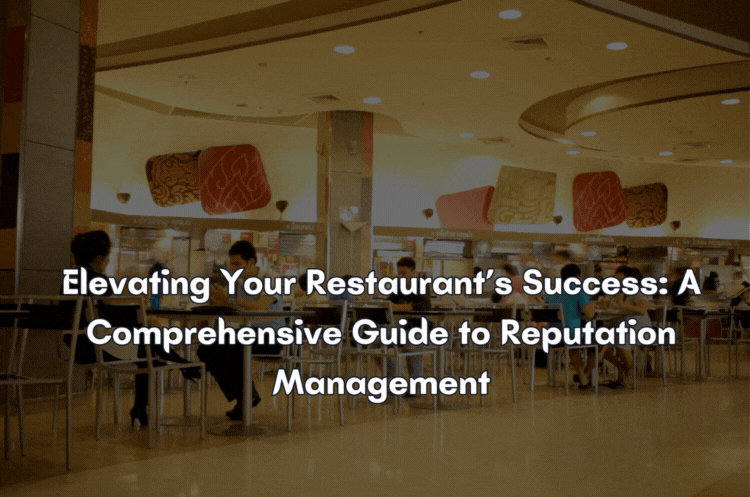Elevating Your Restaurant’s Success: A Comprehensive Guide to Reputation Management
Introduction:
In today’s dynamic culinary landscape, the success of a restaurant extends beyond the kitchen and into the digital realm. Building and managing a restaurant’s reputation is a nuanced dance that influences not only foot traffic but also online orders and customer loyalty. This guide delves into six essential strategies that demystify the art of Reputation Management building, offering practical insights for emerging eateries to elevate their presence both online and offline.
Uphold Your Online Presence:
How: A restaurant’s website and social media platforms serve as virtual storefronts, creating crucial first impressions. A user-friendly website, regularly updated with essential information, and active engagement on social media build an inviting digital face.
Why: A robust online presence acts as a digital ambassador, impacting foot traffic and online orders. It creates an online ecosystem that resonates with customers, inviting them into the restaurant’s narrative.
What: Maintain an up-to-date website and engage with customers on social media to create a compelling digital presence.
Update Offers and Listings:
How: Transparency is key to customer trust. Regularly update offers and listings to reflect menu changes and communicate special offers effectively. Utilize local SEO strategies for increased visibility in local searches.
Why: Updated offers keep patrons informed and attract new customers. Local SEO efforts lead to increased reservations and orders, contributing to a positive reputation.
What: Timely updates create an atmosphere of trust, making the restaurant a reliable destination for regulars and newcomers alike.
Monitor, Respond, and Encourage Reviews:
How: Actively engage with customers on review platforms, responding promptly and empathetically. Encourage satisfied patrons to leave reviews, amplifying positive word-of-mouth and building a loyal customer base.
Why: Online reviews significantly influence dining decisions. Actively participating in the online conversation humanizes the brand and fosters a sense of community.
What: Thoughtful responses and encouraging positive reviews contribute to an ongoing dialogue, shaping a positive online reputation.
Analyze the Competition:

How: Research other restaurants in the area to identify strengths and weaknesses. Implement unique offerings to set the restaurant apart and create a distinct identity.
Why: Understanding the competition attracts new customers and positions the restaurant as an innovator in the local dining scene.
What: Differentiate the restaurant by analyzing the competition, creating a narrative that makes it a standout choice.
Prioritize Proactive Customer Service:
How: Extend proactive customer service beyond online interactions to in-person experiences. Actively seek feedback, address concerns promptly, and create a welcoming atmosphere for a positive dining experience.
Why: Proactive service ensures customer satisfaction and minimizes potential damage to the restaurant’s reputation.
What: A commitment to proactive customer service contributes to a positive narrative around the restaurant, making customer satisfaction a priority.
Embrace Continuous Improvement:
How: Actively seek and act on customer feedback to make necessary adjustments and enhance the dining experience. Adapt to customer preferences to stay relevant in a dynamic market.
Why: Continuous improvement ensures the restaurant thrives by evolving with customer expectations and preferences.
What: Commit to ongoing learning and improvement, shaping the narrative of a restaurant that values growth and customer satisfaction.
In Conclusion:
Successfully managing a restaurant’s reputation requires a strategic blend of online and offline strategies. Prioritizing a robust digital presence, proactive customer service, and continuous improvement allows emerging eateries to carve a positive reputation that resonates with customers. For a tailored approach, consider collaborating with an online reputation management company to build better brand. Such partnerships offer comprehensive solutions designed to elevate the restaurant’s brand and ensure sustained success in the competitive culinary landscape.
FAQ
Q1: What is restaurant reputation management, and why is it important for up-and-coming establishments?
A1: Restaurant reputation management involves tracking and managing a restaurant’s brand image both online and offline. It is crucial for up-and-coming establishments as it directly influences customer perceptions, online visibility, and overall success in a competitive industry.
Q2: How can a restaurant maintain a strong online presence?
A2: Upholding a strong online presence involves regularly updating and maintaining the restaurant’s website and social media platforms. This includes ensuring a user-friendly website, creative content on social media, and timely updates on menus and other relevant information.
Q3: What role do online offers and listings play in restaurant reputation management?
A3: Regularly updating offers and listings is essential for transparency and customer engagement. It enhances the restaurant’s visibility in local searches, contributes to local SEO, and ensures that patrons are informed about changes in hours, menus, or special promotions.
Q4: How should restaurants handle online reviews?
A4: Restaurants should develop a proactive strategy for handling online reviews. This includes responding promptly and empathetically to both positive and negative feedback. Personalized responses showcase a commitment to customer satisfaction and contribute to a positive online reputation.
Q5: Why is it important to analyze the competition in the restaurant industry?
A5: Analyzing the competition helps restaurants understand market trends, identify unique offerings, and differentiate themselves. By learning from competitors’ successes and failures, restaurants can develop strategies that set them apart in a competitive landscape.
For more Blogs:- www.buildbrandbetter.io/blog/

